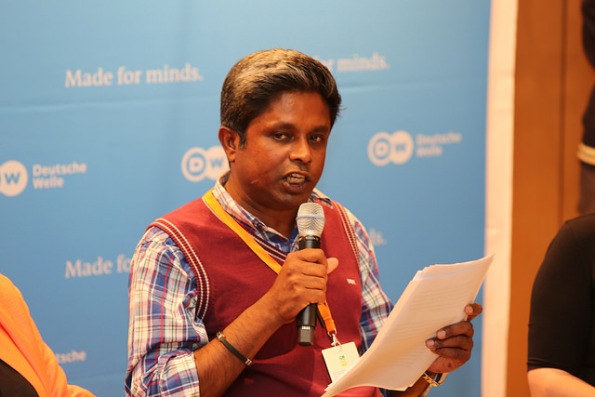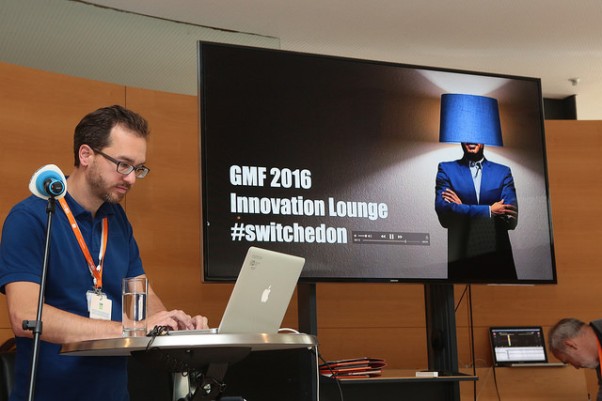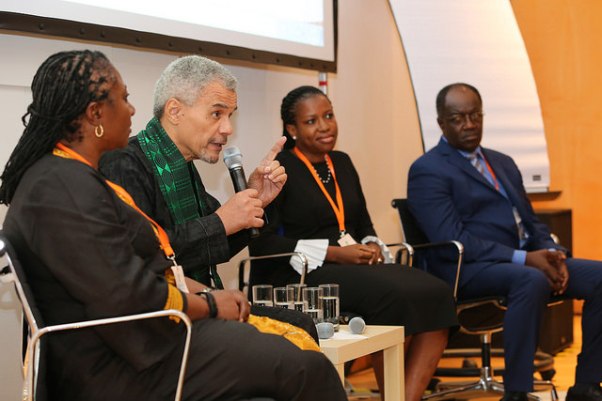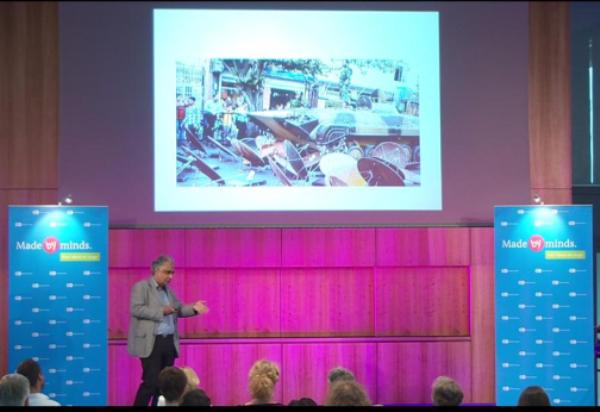Bangladeshi freedom of speech in exile
When the Bangladeshi blogger and publisher Ahmedur Rashid Chowdhury was attacked by Islamists in his office in October 2015, he had been continuing to exercise free speech while knowingly living under threat. At the time several other bloggers who worked with Chowdhury had already been hacked to death for secular and critical writing, including the blogger Avijit Roy earlier in 2015. Barely escaping with his life, Chowdhury decided to leave Bangladesh and currently has asylum in Norway, from where he continues to write about his home country.
Speaking in a panel at the Global Media Forum, Chowdhury acknowledged that he has difficulty talking after the machete attack, as he explained that he would continue to write for those in Bangladesh who are “uneducated and need to know”.
He is one of many Bangladeshi thinkers, writers and bloggers who have been forced to flee their country to Europe, caught somewhere between brutality and isolation just for telling the truth. Also at the panel were Anaya Azad and Shammi Haque who are two young bloggers from Bangladesh who have been forced to leave their friends and families and were given asylum in Germany. They continue to work for people in Bangladesh, while looking forward to the day when they may return home.
The exiled bloggers said that the unifying factor in the deadly climate in Bangladesh was Islamic-based religious extremism that vehemently disallows any criticism or thought that goes against its precepts. This is combined with the unwillingness of government and police to combat extremism. Bloggers make easy targets where the killers are unknown and the government and police take no action. According to one of the panelists, nine bloggers in Bangladesh were killed last year.
DW is actively supporting these brave voices and making sure their stories are heard around the world. The panel was part of a larger campaign, Bloggers at Risk, which focuses on free speech, human rights and freedom for incarcerated bloggers around the world.
Three innovations that are reshaping journalism
Artificial intelligence, data technology and mobile devices have huge potential in advancing the way journalists use and disseminate information. However, bringing innovation into newsrooms requires streamlined applications that journalists can easily use. With a wide network of partnerships and many big ideas, DW’s innovation team is working on an array of research projects to develop tools that will be changing how we produce and consume journalism. These projects were on display at the “Innovation Lounge” during the 2016 Global Media Forum, where guests could experience new tools and technologies hands on.
After looking at the research and development being done at DW Innovation, it becomes clear that journalists need solutions for using and interpreting large amounts of data and information coming from many sources, languages and formats. There is more information available than ever before and the key is turning information into interesting stories.
Natural Language Generation (NLG) technology, being pioneered by start-ups such as Narrative Science, turns data into readable reports. Applying this to journalism, DW’s innovation team is currently working on a new project called PollyVote, which for the first time is developing tools to transform polling data into automated news reports for the 2016 US presidential election. Research done by DW Innovation indicates audiences tend to respond positively to these automatic reports, citing a study that ranked them as informative, trustworthy and accurate.
Besides having raw data as useable information, journalists also have a huge variety of news sources at their disposal. At the intersection of big data, automation and multimedia production is News Stream, a joint project being developed by Fraunhofer IAIS, Neofonie GmbH, dpa and DW.
News Stream combines multimedia sources on one platform so journalists can quickly find exactly the information they need to create the best possible content. From pinpointing audio clips to digging quotes out of manuscripts, journalists can access all possible content on a news item in one place.
For example, News Stream uses voice recognition technology that can identify the subjects voice in a recorded press conference and send an automatic e-mail to the journalist with the desired quote. It also allows for automated research covering social media, agency sources and other news outlets. Journalists can even monitor in real time how the competition is reporting on a news item in real time.
According to the team at DW Innovation, at the moment News Stream has the potential to help journalists create better content more efficiently, but the most important step still is integrating these tools into newsrooms.
Adding to the journalists’ innovation toolbox along with raw data aggregation and source integration are methods for working with social media and eyewitness media as a news source. Both present problems of verification, but are becoming indispensible for fast-breaking news stories.
Reveal is a EU-supported project focused on dealing with social media verification. Multiple partners, including DW Innovation, work on tools, methods and technologies that will support journalists with the verification of online news items.
As part of the project, DW Innovation has developed a verification checklist for DW and media partners like ARD and EBU that outlines the fundamentals of how to use eyewitness material in news reports. This helps journalists everywhere make better decisions about breaking news content and produce trustworthy reports. There is furthermore a growing niche verification industry with examples like First Draft News, which brings together a variety of verification resources, or Storyful, which curates viral content and provides verification of UGC and social content for news outlets.
In order to continue its work in this field, DW Innovation has secured funding from Google’s Digital News Initiative (DNI) to build a collaborative social media verification platform and to launch another EU co-funded project called inVid,which specifically develops tools and workflows for video verification.
As the public comes to expect better data journalism and different ways to experience news, these types of innovations that are pioneered at DW will be growing in relevance and presence across our media landscape.
Eco Heroes: A hands-on approach to environmental activism in Africa
At DW’s annual media conference, the Global Media Forum, Nigerian “Eco Heroes” appeared in a panel discussion hosted by Eco@Africa anchor Nneota Egbe to share their ideas and insight into environmental problems affecting Nigeria. The Eco Heroes share a common passion for raising environmental awareness and helping their communities through activism and innovation.
DW’s environmental program Eco@Africa shows the world that environmentally conscious innovation and development starts with people and communities. The coproduction from DW and Channels TV in Nigeria showcases both problems and solutions involving an array of environmental issues in Africa and Europe.
Environmental problems in Nigeria combine social, political and technical issues that the Eco Heroes addressed during their discussion. One pervasive environmental problem in Nigeria is plastic waste. Eco Heroes Bilikiss Adebiyi and Yahaya Ahmed, both take this on in creative and unexpected ways. Coca Cola alone sells around 4 million plastic bottles a week in Nigeria and the empty bottles can be put to good use. Adebiyi created an incentive for recycling by founding WeCyclers – a bicycle-powered recycling service in Lagos for densely populated and low-income neighborhoods. For their recyclable items, households receive reward points that they can exchange for goods and services – keeping plastic out of landfills and raising awareness in the community.
Ahmed, CEO of the Development Association for Renewable Energies (DARE) takes the bottles whole, fills them with sand and uses them in constructing homes, walls and water containers. DARE also looks at the social aspects of environmental problems and recruits people who have had to leave their homes because of increasing desertification.
The Eco Heroes also emphasized that social awareness is a crucial part of environmentalism in Africa. Each of them spoke about putting problems in terms that people can understand. For example, rather than talking about the “environment”, Desmond Majekodunmi said he prefers to think of a “life support system”– an idea that encourages people to act with care. He said educating children on environmental issues and doing simple things like planting trees are tangible ways to address such large problems.
A holistic approach to environmentalism combines social and structural issues. Priscilla Achapka, Executive Director of the Women Environmental Program, warns of a “social time bomb”, as lakes dry out and populations are forced together. Her work focuses on teaching women who run households sustainable solutions to everyday issues, which will create better living spaces in communities that will be growing closer together.
The Eco Heroes agreed that the media is essential for making these complex problems understandable and conveying essential information for environmentally conscious living. They praised DW, Channels TV and Eco@Africa for cooperating and helping to make a valuable contribution to raising awareness and spreading a positive message.
Eco@Africa has also proven to be a big success with audiences Nigeria. And after a successful start there, the show will soon be expanding to Kenya. Kenya Television Network (KTN) will be the new broadcasting partner for the show in East Africa. The expansion will provide a source of information that can make a positive difference to communities across the region. KTN has been a DW programming partner since 2012.
Finding allies in the cat and mouse game of censorship in Iran
In places where media freedom is guaranteed, censorship isn’t given a second thought. In places like Iran, people confront it every day. On television, newspapers, radio and online censorship in Iran is everywhere. There is a war of information in Iran with propaganda adding to the oppression of free information. People try and find information on the one side, and the government tries to stop it on the other.
In Iran, DW’s online content in Farsi has seen huge leaps in usage since Iranian authorities clamped down on the Iranian internet. By using circumvention techniques like Psiphon, DW has been able to provide people in Iran with unbiased news coverage. But it is a game of cat and mouse , and the rules change constantly. What worked a year ago often has to be changed. DW keeps up with the latest technology and has many partners with the same goal.
DW is joined by a group of international broadcasters known as the DG 7, which includes the BBC and France Médias Monde that meet and work together regularly to create solutions together and keep up with fighting censorship around the world.
Joining a plenary discussion on censorship at this year’s Global Media Forum is the Iranian journalist Arash Sigarchi. He is now Web Manager of Voice of America (Persian) in the USA. He was imprisoned for three years in Iran for using a blog and telephone interviews to try and get around government censorship. Now Sigarchi says that new possibilities of social media give people many ways to freely share information. This and the consistent effort of international broadcasters like DW to get through to people all over the world, can help ensure the future is built on truth.
Market roundup: June 2016
North America
DW’s global English-language channel is now available in HD quality across North America. Partners in the USA and Canada can directly receive the channel on the SES-3 satellite. Numerous DW programs like Focus on Europe, Global 3000 and DW News will also soon be available in HD on the US public broadcasting network, PBS.
Africa
The Ghanaian broadcaster ABN TV is a new DW partner. Launching in 2013, the broadcaster reaches 10 million households in Africa and Europe via satellite. ABN TV is now broadcasting World Stories, Global 3000, Kick Off! Countdown, Kick Off! Bundesliga Highlights, Documentaries and Reports, In Good Shape and Conflict Zone.
Télé-Chad is now broadcasting a selection of programming from DW (Arabia). Kick Off!, Drive It and Tomorrow Today will now be broadcast both terrestrially and on NILESAT 201.
Asia
The Karachi-based broadband internet provider Connect Communications is a new DW partner in Pakistan. Offering a wide-range of broadband services, their television subsidiary dedear.com is broadcasting DW’s English-language channel to 70,000 households.
DW mobile content is now available to 5 million subscribers of Reliance JIO. Reliance is one of India’s fastest-growing providers of high-speed mobile connectivity.
Australia
DW’s Conflict Zone is now being broadcast on ABC News 24. The flagship news channel from the Australian Broadcasting Corporation reaches a potential 8.6 million households nationwide.













Feedback